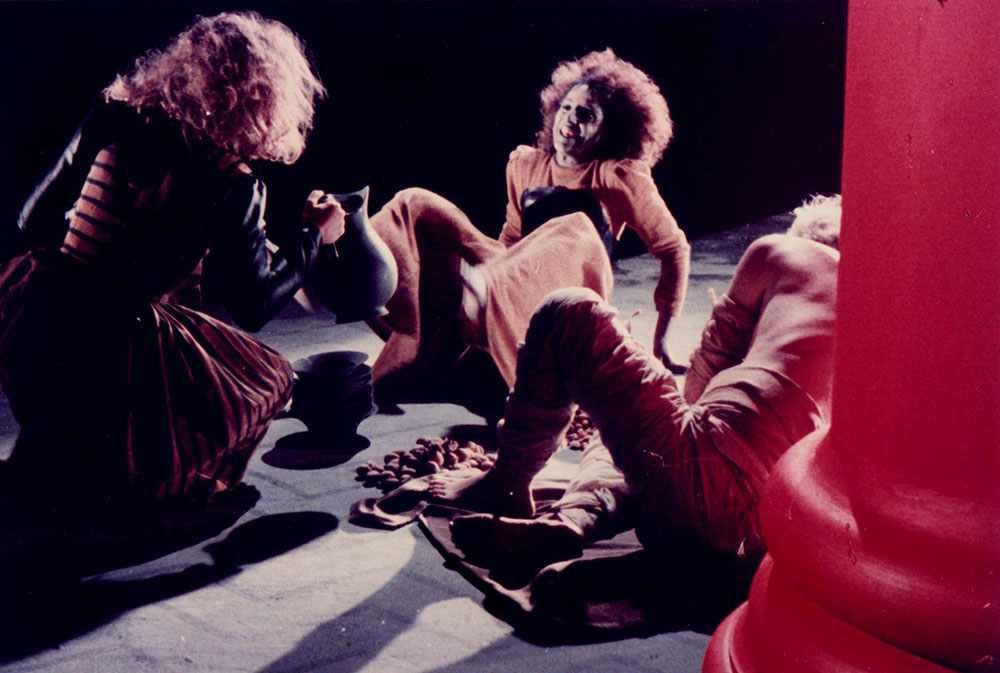The fourth edition of Prismatic Ground kicks off tonight with Michel Khleifi’s Fertile Memory (1981). In the opening scene, the elderly Farah Hatoum prepares for her hour-long commute from Jaffa to work at a swimsuit factory. Her quick but careful hands pack fruits and vegetables from a plate. The film sketches the parallel lives of Hatoum and the novelist Sahar Khalifeh, alternating between observations of domestic chores and wide pans of farms and city-scapes in the occupied West Bank of Palestine. Interspersed by lucid statements from Khalifeh on her personal life decisions and her politically oriented writing, the film presents a double-bind faced by the two women, both of whom experience isolation living without their husbands in a lineage-oriented culture whose home is meanwhile being wrenched away. A break from the colorful vérité occurs toward the end of the film, when Khleifi inserts black-and-white newsreels of a standoff between Palestinian youth activists and soldiers of the Israeli Defense Forces. The latter eventually opens gunfire into the crowd—off-screen protestors chant, “even our children who are breastfeeding will not submit!”
Prismatic Ground showcases non-fiction films that push exposition and form, displaying an affinity for works from a postcolonial, process-oriented, and at-times mythic stance. Founder Inney Prakash’s ardor for experimental documentaries and avant-garde films reveals itself in his curation, which mixes dozens of new shorts and features with films of historical relevance. This year includes two retrospectives: one of the Greek avant-garde director Antoinetta Angelidi—the festival’s Ground Glass Award Recipient—and the other of the late artist and Lower East Side personage Aldo Tambellini.
Threaded through the 2024 program is a particular focus on films of Palestinian resistance. Highlights include Razan AlSalah’s attentive mappings of exile across Haifa, Beirut, and Zirku Island in A Stone’s Throw (2024), which will be paired with Basma al-Sharif’s sardonic critique of Egyptian expansionism in Capital (2023, pictured at top); the eerie and mournful UNDR (2024) by Kamal Aljafari; and the equally haunting memoiristic film Familiar Phantoms (2023) by Larissa Sansour and Søren Lind. These screenings coincide with the propping up of university encampments across the United States, which fervently call for institutional divestment from Israel and condemn the ongoing genocide of Palestinians. Prismatic Ground joins several film organizations endorsing the Palestinian Campaign for the Academic and Cultural Boycott of Israel (PACBI), relaying a pointed stance that echoes across the program as a whole.

Of the near-ninety films being screened in New York between May 8–12, one mode of inquiry that comes to fore is an exploration of group language—the actions differentiating political messages from gibberish or glossolalia, as well as the potential for non-speech to carry shared meaning. Protest chants ring across the works, from the shouted refrains that end Fertile Memory to Priya Sen’s No Stranger At All (2023, an encore screening from last year’s program). In this film, Sen evokes the phrase Hallabol, which the film defines early on as “to raise our voices against / to disrupt,” against the rise of Hindutva rule during Delhi’s Covid lockdowns. Journalism and poetry are likewise seized by activists to concretize demands in Gurvinder Singh’s Trolley Times (2023), which portrays the enormous sit-in protests staged outside of New Delhi against the Modi government’s moves to deregulate agricultural trade in 2020. Determination brings Punjabi and Haryanvi farmers to produce and distribute the eponymous news pamphlet Trolley Times, which they wield as a tonic against the biases of mainstream media. “Know your rights,” asserts one of the activists. “Make children and women read it.”
A current of rage undergirds Derek B. Jenkins’s As close as your voice can call (2023), in which the filmmaker revisits children’s books that had belonged to his deceased mother. Between archival footage of Koko the gorilla and of the composer Kirk Nurock conducting elementary school students in rhythmic hollering, a subtitle reads: “Most linguists agree that what Koko was doing was not language. And it certainly wasn’t ASL. Koko learned how to give them what they wanted. They say she learned how to give them what they wanted in over 400 ways.” In no frivolous way, and with no guaranteed valence, the film asserts that faith in the speech of another can be aided by actions of repetition and insistence.
Two people speak at a slant in Sky Hopinka’s Just a Soul Responding (2023), a road movie in its own where Hopinka and Abby Lord exchange poetic-epistolary narrations across four panels of imagery. Filmed in luscious, cool-tinted Super 16, the film presents discrepancies between speech and subtitling, simultaneous P.O.V. shots of drives down U.S. roadways, and footage of musical performance by the charismatic JP Falcon Band—a dizzying polyrhythmic journey. Coalescing the varied movements are scenes from the workshop of a traditional canoe builder who describes how his treatment of pine and cedar forges ancestral linkage. The red glow of the canoe hedges with the metallic sparkling of muscle cars in Hopinka’s wry twist on Americana.

Tamer Hassan relays another type of journey in oft-wide apertures, with held breath, and without narration in Homing (2023). The film follows the annual voyage of purple martins from the Amazon to the Great Lakes. Since the destruction of their nests by colonization, the birds have for centuries developed a choreography with human conservationists—both amateur and professional—who build birdhouses along their migratory path. The martins swerve across mall parking lots and over an evening sky lit by AT&T’s logo. Homing feels grounded in its precise and earnest approach to shot composition, which lends itself to an unflinching patience and curiosity.
A surprising gem in the program is Us and the Night (2024) by Audrey Lam, a paean to language that transcends solipsism in its evocation of speech and reading as a foreign landscape—it’s a film enamored with words and literature, unmired by theoretical jargon. As a love story between bashful student workers at a university library, Lam’s virtuosic script creates levity where unwieldy notions of the sublime have long burdened academic language. In moments as quick as the soft lilt in the narrator’s voice when she puns on the school as a “universe-city,” or a captivating sequence where the spritely protagonist, Umi, climbs through part of a shelf that happens to have empty space between books, the two students are shown moving across the dusty, carpeted library as if it were a thrilling metropolis or a bewildering planet. Risk in reaching toward another person amongst heaps of books and words joins an excitement for the unknowns of a relationship.
Variegated reassemblages of time, geography, and social relations comprise Prismatic Ground’s unique contributions to contemporary film programming. This year’s slate highlights filmmakers’ greater openness to collaborate, renewed approaches to montage, and the capacities of material and analog processes alongside handheld video. Especially potent when considered as a whole are the spaces these films open around political language, specifically speech, by emphasizing the non-verbal gestures and cacophonous sounds that accompany strife and calls to action today and throughout history.
Prismatic Ground runs from May 8-May 12 across the Museum of the Moving Image, DCTV’s Firehouse Cinema, Light Industry, and Anthology Film Archives, and online with wave ∞, a virtual selection free to watch at prismaticground.com.



